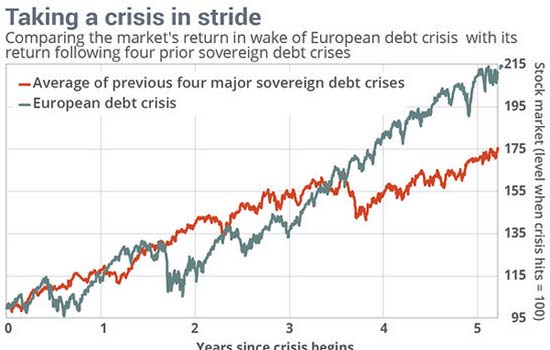I'm getting dozens of questions about Greece right now and what it means for your money.
That's fantastic for two reasons.First, it means you're totally on point and thinking clearly in the pursuit of profits.
Second, it's a sign that you're already fully engaged in our Total Wealth strategy and one of our core Total Wealth principles – namely that there's always opportunity in chaos, if you have the right tactics.
Greece is the single most important thing happening in the markets right now. I know that the mainstream press is treating it as an afterthought and the temptation is to regard it as "over there." But the financial markets have proven again and again that events taking place thousands of miles from our own shores clearly influence market behavior closer to home.
I'm going to lay out the three scenarios for what is about to happen and how it will affect you. Then I'm going to show you three trades you can make today.
And don't wait to make your move.
Greece has only about 13 days to go before it runs out of cash, according to JPMorgan.
Here's everything you need to know now…
What's everyone in Europe so angry about?
Simply put, Greece lied to get into the EU, managed its finances terribly while ostensibly a part of the bigger picture, and now wants to renege on its obligations… or at least renegotiate them.
Greece owes some 320 billion euros, approximately 75% of which is due to lenders including the IMF, ECB, EFSF, and Eurozone governments, all of whom are doing business with the world's big banks and trading houses. And again, they're now refusing to pay it back. Swept in on a populist vote, Greece's new PM, Alexis Tsipras is rejecting austerity, equating it to economic "blackmail."
I get where he's coming from but to think there wouldn't be conditions on the bailout that has saved his country to date is just plain naïve. But that's a subject for another time, and possibly a debate or two.
The real problem is that each euro that's been borrowed has been hypothecated – pledged as collateral for debt – at least once, but perhaps re-hypothecated as many as nine times, because of the way the world's fractional deposit banking system works and the largesse associated with government printing.
In plain English, this means two things…
- There may be only one euro in the system for every nine created out of thin air.
- The banks have entered into agreements that reuse collateral pledged by clients for its own trading or borrowing.
Bear with me. I know this is hard to wrap your head around especially when it's ostensibly a government/banking problem but this is what most people are missing.
There's a huge cost to this Greek debt for each person in the most exposed countries, in the event Europe has to do a total bailout. If you live in Denmark or Germany, for example, you owe 708 euros and 700 euros respectively to cover Greece's mess. Finland… 687 euros. And so on.
It's no wonder the chorus of voices calling for Greece to exit is growing, a position I've maintained since 2007. So it's great to have company… finally.
What would a Greek exit really mean for global markets?
The global trading community isn't sure what to make of all this. So you're seeing more volatility than usual in all three of the broader market indexes – the S&P 500, the Dow Jones, and the NASDAQ. World markets are not any different, for the most part.
That's understandable given the headlines and the dawning realization that Greece has only about 13 days to go before it runs out of cash, according to JPMorgan.
In one corner you've got people like Gary Burtless, a senior fellow at the Brookings Institution who believes a Greek exit ("Grexit") is a potential catastrophe. In the other you've got folks like Allianz (XETRA:ALVG)'s Chief Economic Advisor, Mohamed El-Erian, saying it's not a big deal.
I think the truth is somewhere in between.
Don't forget that the euro is like the "Hotel California" of global currencies in that you can "check in anytime, but you can never leave" to paraphrase the old Eagles song by the same name. Nobody envisioned that a country would ever depart when the euro was put together. So there were never provisions made for a situation like this.
That's both good and bad news.
The good news is that we're in uncharted territory, so the world's central banks can be creative. I know that's scary, especially since I think they've been "creative" enough already. The money-meddling is ultimately going to end badly… just probably not tomorrow.
The bad news is that if Greece reneges and is either thrown out or walks out, the remaining clique is going to have to do some fancy footwork to convince other countries to stay with the euro. Think Spain, Portugal, Italy, and Ireland here.
The question then becomes what makes staying "worth it" for the remaining members, and I don't think the ECB is prepared to answer that. I say that because S&P 500 downgraded Greece's credit rating while at nearly the same time, the ECB prohibited banks from using Greek debt as collateral.
My take since the beginning of the financial crisis is that Greece should be booted out on its drachma. The only question is whether that's a controlled exit or more akin to a default.
So what happens next?
I see three possible scenarios.
- Greece does depart the euro. If that happens, the euro drops like a rock and may even be worth less than $1 USD in the next 60 days. The U.S. markets tank by 10% and global markets follow. Then, traders get back down to business and the world moves on as central banks ride to the rescue with some form of QE even though they won't call it that. Dips are a buying opportunity with a 12 to 24 month horizon.
- The ECB forces new regulations on Greek banks above and beyond the conditions they've imposed now. This produces some minor volatility in U.S. markets, and global markets stabilize accordingly. The euro drops but stops short of breaking the buck. Here, too, the dip is a buying opportunity.
- There's an agreement at the last minute (after incessant posturing, hand wringing, and lots of earnest-looking political sound bites from the world's leaders imploring "action" in the name of good global citizenship). This produces a rally and a strong one at that. The derivatives traders lever up even further, having "averted" a crisis. Or at least that will be the official story.
Scenario No. 1 would be best for the markets. Not immediately, mind you, but for the long term. That's because it would force a realignment of risk with reality rather than this fantasy land "all gain no pain" bailout money-meddling madness we're living with now.
Believe it or not, history shows that a rally usually follows the cleaning crew. Not many people are expecting that.
That was the case in each of the four most recent "global" financial crises: in 1994 when the Mexican peso devalued, in 1997 when the Thai government debt crisis roiled markets, in 1998 when the Russian ruble devalued, and in 2001 when the Argentinian government had its currency crisis.

Source: Hulbert Financial Digest
Okay, but what WILL happen next?
This time around I believe we're going to see a blend of scenario No. 2 and No. 3. That's because Greece will blink and politicians the world over will allow Greece to remortgage its financial obligations against a future that somehow never arrives.
Ultimately, though, we're going to be back at the table again.
My guess is no more than 24 months from now when the populist vote that has brought all this to a head realizes that you really do have to pay your bills whether you like austerity or not.
How do I trade all of this… and when?
The first move is to bet against the euro by buying the ProShares Short Euro (NYSE:EUFX).
Critics charge that the trade is getting crowded, but I don't think so. In fact, I believe the trade still has a way to go, especially if there's a Grexit.
The second move is to buy short-term U.S. Treasuries or other extremely low-risk short term bonds. If there's an exit, the world's traders will bid these things up faster than hot air at a political convention.
Or, if safety with a little spice is more your speed, consider one of my favorite "no drama" choices, the Near-Term Tax-Free Fund (NEARX) from U.S. Global Investors. The fund ranks highly in safety because it invests in state and local municipal bonds issued all throughout America. Exactly the kind of stuff traders will run to if Greece debt gets carried out feet first.
And, third, you'll want to sharpen your pencil and get ready to buy, with particular focus on big, fortress-like companies that are "must haves" and latched in firmly to one or more of the Unstoppable Trends we're following – like Raytheon Company (NYSE:RTN) and even Apple Inc (NASDAQ:AAPL).
You'll know it's time to back up the truck and buy when one of three things happens: 1) you see a magazine cover proclaiming the end of the financial universe as we know it, 2) you hear a politician gripe about how "nobody saw this coming," or 3) your neighbor swears off stocks for as long as he or she lives.
Right on cue.
